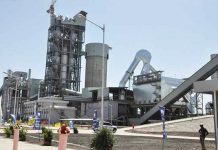
What Ould Tah’s Tenure at BADEA Reveals About His AfDB Candidacy
By Jide Akintunde
Pull Quote: For the AfDB to remain credible in the evolving development finance environment, as it has successfully done under the outgoing President Akinwumi Adesina, it will require a leadership that understands both the internal discipline of multilateral institutions and the external demands of a changing global order.
On April 8, the Board of Governors of the Arab Bank for Economic Development in Africa (BADEA) appointed Abdullah Almusaibeeh, a Kuwaiti national, as the bank’s new President. Mr. Almusaibeeh will formally assume office on July 1, 2025, after the conclusion of the tenure of the current CEO, Sidi Ould Tah
on June 30. Dr. Tah, of Mauritanian nationality, is expected to commence administrative leave in mid-April, leaving the day-to-day management of the bank in the hands of a substantive CEO.
This seamless transition indicates the institutional stability that BADEA has enjoyed under the leadership of Tah, who is among the candidates being considered for the AfDB presidency. The candidates will be judged on multiple factors. But Tah’s time at BADEA provides a basis for understanding the type of leader he has been, and how it will benefit the AfDB.
When Dr. Tah assumed the presidency of BADEA in 2015, the bank was well regarded in policy circles but relatively quiet on the wider African development landscape. Over the following years, BADEA expanded its operational presence across 44 African countries and steadily increased its annual approvals, reaching $629.5 million in 2023 – more than double the high levels recorded in the mid-2010s. Indeed, since its inception 50 years ago, BADEA has funded projects and operations amounting to over $15 billion, out of which $11 billion was delivered under Tah’s leadership. In just 10 years, the bank provided more than twice the financing it had in the preceding four decades, across, concessional financing, trade support, and sovereign project lending.
BADEA’s product offering also evolved. In 2022, the bank disbursed $100 million through its Trade Finance Window, created to address liquidity constraints for African importers and exporters particularly during the recovery phase of the COVID-19 pandemic. The institution also increased its allocation to fragile states and borderland regions, with targeted investments in energy, transport, and water supply in countries including Chad, Guinea-Bissau, Sierra Leone, and Comoros.
Over the past decade, BADEA’s strategic investments under Tah’s executive leadership increasingly focused on SME competitiveness, entrepreneurship, and infrastructure-driven transformation. The bank channeled approximately $2.3 billion into over 800 SMEs, creating more than 50,000 jobs across Africa, including Côte d’Ivoire, Kenya, Nigeria, Sudan, and the Democratic Republic of Congo. These investments spanned agriculture, renewable energy, and technology startups. These sectors are recognized to be central to inclusive growth and regional competitiveness.
BADEA also invested heavily in cross-border connectivity and green infrastructure. Over $1.2 billion was committed to roads linking agricultural zones in East Africa, reducing transport costs by 15% and enabling farmers to access markets more reliably. Additionally, 400 MW of solar energy capacity was financed in arid and energy-poor countries such as Mali, Niger, and Burkina Faso, powering over 200,000 homes and businesses and contributing to long-term economic and environmental resilience.
Internally, the bank introduced project tracking dashboards, digitised performance reporting, and updated fiduciary and procurement rules in line with Arab Coordination Group standards. Independent auditors issued unqualified opinions for all fiscal years from 2016 through 2023. The number of projects rated “on track” for development effectiveness in internal reviews increased significantly by the second half of Dr. Tah’s tenure. The bank’s non-performing loan ratio also declined sharply – from over 10% to just 0.5% – despite an eightfold increase in annual disbursements.
Gender-responsive programming also gained traction during this period. From 2020 onward, over 60% of BADEA-funded projects incorporated components designed to empower women economically through targeted SME finance, vocational training, or support for women-led agricultural enterprises. These efforts reflected a growing institutional recognition that inclusive growth required not only macroeconomic stability but also expanded participation by women in the economic life of their communities.
Another feature of BADEA’s evolution during this period was its gradual but deliberate integration of private sector participation into development financing. The bank expanded its use of blended finance instruments and began deploying lines of credit to local financial institutions – particularly in West and East Africa – to strengthen access to capital for micro, small, and medium-sized enterprises. It also supported projects where private contractors and operators played central roles, notably in solar energy systems, agro-industrial clusters, and logistics infrastructure. While these interventions remained relatively small in volume, they reflected a clear institutional pivot from a purely sovereign lending model to one that increasingly acknowledged the role of private enterprise in delivering public goods.
Observers familiar with his tenure describe Tah’s leadership style as technically grounded and institutionally focused. He did not dominate headlines or rely on political theatrics. Instead, he built relationships through delivery, governance reforms, and cautious expansion. BADEA, under his stewardship, strengthened its presence at regional investment platforms, including the Africa Investment Forum and the Dakar 2 Summit, while maintaining a conservative financial profile. It also earned high international credit ratings, transitioned from a self-funded model to a regular issuer on global capital markets, and secured ISO certifications in ESG, quality management, and IT security. The bank also successfully underwent a comprehensive digital transformation.
BADEA, in this period, also demonstrated notable resilience in navigating multiple crises, including the pandemic, regional political instability, and the war in Sudan. In recognition of the successful implementation of its transformation agenda, BADEA’s shareholders approved a 376% capital increase in 2022.
The global development finance landscape is undergoing rapid transformation. Non-Regional Member Countries (NRMCs), facing shifting geopolitical realities, are now calling for greater transparency, more targeted co-financing, and improved alignment between multilateral banks and global policy frameworks – whether in climate finance, debt sustainability, or regional trade integration. For the AfDB to remain credible in this evolving environment, as it has successfully done under the outgoing President Akinwumi Adesina, it will require a leadership that understands both the internal discipline of multilateral institutions and the external demands of a changing global order. Experience in navigating between these two spheres may prove increasingly important.
The African Development Bank, like all major multilaterals, is entering a phase of heightened scrutiny. Shareholders are demanding faster disbursement, clearer impact metrics, and stronger integration with national development frameworks. Countries with urgent infrastructure and industrialisation priorities – particularly in the Sahel, West Africa, and Horn of Africa – are pushing for institutions that can mobilise capital quickly and manage risk credibly.
In this context, BADEA’s evolution in recent years provides a relevant, though not exhaustive, reference point. It shows how an institution with limited scale, but ambitious mandate, can expand responsibly, adapt its instruments, and maintain shareholder confidence. That does not predetermine the outcome of the AfDB election, but it introduces a set of performance indicators that are concrete, not conceptual.
This also has implications for Nigeria. As of 2024, Nigeria is the largest African shareholder in AfDB, with a voting share of 9.26%. Between 2018 and 2023, Nigeria received an estimated $1.76 billion in AfDB funding across energy, including the $210 million Nigeria Transmission Expansion Project, the Special Agro-Industrial Processing Zones initiative, transport, and human capital programmes. These disbursements have been essential for implementing elements of the Renewed Hope Agenda of the current administration of President Bola Ahmed Tinubu, particularly infrastructure delivery, industrial corridor development, and job creation.
Nigeria’s engagement with AfDB is, therefore, not symbolic; it is strategic. The leadership and institutional direction of the bank will directly shape how effectively the country can mobilise support for its economic blueprint in the years ahead. It also matters in broader regional terms, as the AfDB remains central to continental initiatives like the Programme for Infrastructure Development in Africa (PIDA) and the Desert to Power initiative in the Sahel.
None of this is an attempt to preempt the AfDB selection process. But the foregoing provides credible yardsticks for evaluating all candidates on their institutional governance experience, track record in sovereign engagement, and ability to steward complex, multi-partner development financing. These are not easily claimed attributes; they are earned overtime and visible in institutional records.
Dr. Tah’s work at BADEA – or the sole experience of any one candidate – will not determine the AfDB presidency. But he does leave behind an accessible trail of institutional performance, managerial stability, and policy pragmatism. These are useful benchmarks in a competitive selection process.
At a time when development finance in Africa must be both faster and more trustworthy, there is value in looking not at who makes the loudest promises – but at who leaves the clearest footprints.
Jide Akintunde is the Managing Editor of Financial Nigeria magazine – Africa’s premier development and finance journal.

































